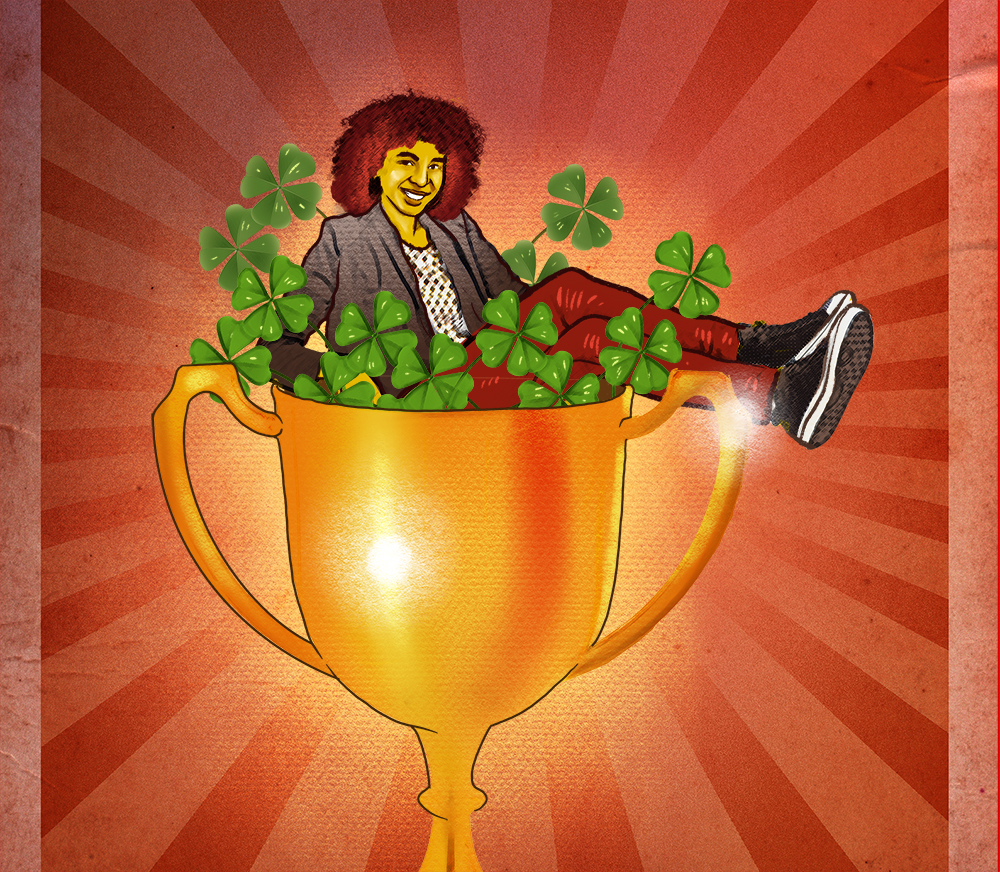LET’S GET THIS out of the way: Much of your business success has been because of luck. Yes, that’s a little unpalatable, but it’s true. And the more successful you’ve been, the more luck you’ve had.
Wait! Don’t toss this issue of PETS+ aside … at least just yet. This success-luck thing does require some pre-conditions: You also happen to be skilled at what you do, and likely very hard working.
The Nobel Prize-winning behavioral economist Daniel Kahneman sums up this secret to professional success in what he calls his favorite formula:
Success = talent + luck
Great success = a little more talent + a lot of luck

The work of Kahneman, best known for his studies into cognitive biases, backs up much other research that says we humans drastically undervalue the influence of luck in many situations, and overvalue it in others. When we asked independent pet retailers and service providers in the PETS+ Brain Squad to consider their careers and the factors behind their business success, they ranked “Drive and ambition” as the most important and “Luck,” everything they don’t fully control, as the least.
This viewpoint has to do with something psychologists refer to as the locus of control, or how much you think you control the events happening around you. Most people have an internal locus when it comes to good things — they take credit for their successes — but an external locus when things go wrong.
This is not just a robust ego at work. It’s also the “availability heuristic,” the bias whereby we attach more significance to things that are easier to call to mind. It’s not hard to remember the countless times you put in effort to succeed: slogging through 14-hour days during the holiday season, preparing reams of documents for loan applications, managing problematic team members. By contrast, it’s genuinely difficult to perceive ways you may have been fortunate: to open or expand a business at a time of historically low interest rates, to benefit from a global shift toward the humanization of pets, to ride the back of years of unbroken economic growth …
In truth, we control much less than we like to believe.
When it comes to CEOs of big corporations, one Harvard Business School study found their impact on company success ranges from just 2 to 22%, depending on the industry. Another study from Texas A&M University put the figure at between 4 and 5%. The impact of owners or top managers of small businesses is significantly higher, but success still tends to be distributed randomly. Indeed, studies have shown a zero correlation between the factors traditionally attributed to professional success — skill, intelligence, risk and hard work — and the degree of success. In other words, a business owner who ranks higher in those attributes should, in theory, do better by a consistent degree than someone who scores lower, but no such correlation exists.
Even setting such esoteric studies aside, it doesn’t take much to notice that conventional success isn’t achieved solely through hard work and talent. Give quick thought to what have probably been the most important events in your life: the family you were born into, the community you grew up in, the people you’ve unexpectedly met … chance reigned!
There are reasons most business owners and managers don’t usually want to talk about the role of luck in their success. It’s not just that it takes some of the shine off accomplishments, but because in the purest, blindest sense, luck is random and thus boring. If it’s out of your control, why bother?
To be sure, dumb luck like winning-the-lottery luck is not worth giving much thought to. But the other kinds of luck, those that you at least partially control — luck you provoke, fortunes and misfortunes you prepare for, luck tapped through an understanding of probability, and that which comes from hard work or serendipitous networking — can give your pet business a huge boost when fostered.
Indeed, Nassim Nicholas Taleb argues in his best-selling book, The Black Swan, that luck is the key force at the heart of our economic system, as the biggest rewards tend to come from the deepest unpredictability. The reason free markets work, he asserts, is because they allow people to be lucky thanks to aggressive trial and error, not by rewarding or incentivizing skill. When it comes to business, luck is almost like an evolutionary power rewarding random adaptiveness.
It is this disconnect between skill and luck that sometimes proves the hardest to understand. Counter-intuitively, the more competitive and skilled the players in a marketplace or other segment in life, the more luck you need.
Advertisement
Billy Beane, the central character in Michael Lewis’s book Moneyball, about the improbable winning run of the Oakland A’s in the early 2000s, makes this surprising point as his undervalued team are about to embark on their first play-off run: His statistical analysis doesn’t work in the play-offs — their success will now come down to luck, he says. When the two best teams in the division or country face off, the difference in skill is often marginal and alone will not settle the contest. Luck matters more than ever.
It’s this that partly explains why so few teams consecutively repeat as champs, why last year’s top fund managers underperform the following year, and why businesses rise and fall. Consider the 50 companies featured in three of the most popular business bestsellers of the past 40 years: In Search Of Excellence, Good to Great and the unfortunately named Built to Last. Of the 50, 16 failed within five years after the books were published, and 23 became mediocre as they underperformed the S&P 500 Index. It wasn’t because their managers or employees stopped trying or innovating. It was because things even out. If you get an extreme result in one period, the next result will probably drift toward the average. Statisticians call it regression to mean. Regular people might just say their luck ran out.
All of this is not to imply you are helpless before fate or that you should bet the coming month’s payroll on the roulette table the next time you’re in Vegas for SuperZoo. There is still much in life you do control — and luck, while it can’t be fully tamed, can be greatly influenced.
Among people who study variance, chance and fortune — a surprisingly eclectic lot that includes psychologists, poker players, stock market quants, Stoics and Buddhist monks — there is a common view that luck is neither bad nor good nor personal. Without us to supply meaning, it’s simply “noise.” It’s how we deal with it that matters. Indeed, it is managing this interplay between chance and skill that makes life so interesting.
In the following pages, we provide 17 ideas — shared by experts in this field of study and from our own reading, with examples from your fellow pet business owners — on how to improve your odds in the face of such uncertainty. Good luck!
1. Be on the
Lookout for Luck
It starts with observation. “You’re not lucky because more good things are actually happening; you’re lucky because you’re alert to them when they do,” psychology writer Maria Konnikova writes in The Biggest Bluff: How I Learned to Pay Attention, Master Myself, And Win. “If we want to be successful, we need to train our powers of observation, to cultivate that attitude of mind of being constantly on the lookout for the unexpected and make a habit of examining every clue that chance presents.”
Anna Woodcock of Brown Dog Bakery in Ankeny, IA, did exactly that in 2020 when the retail space next to her store suddenly became available. While it was easy enough to notice such a vacancy, she saw it as an opportunity to expand her business — deemed essential during the pandemic — by doubling retail square footage and tripling grooming staff. She gives partial credit to the resulting success where it’s due: “It was truly luck and has totally shaped the trajectory of my business.”

2. Keep an
Open Mind
Part of the challenge is that good-luck events often reveal themselves in ambiguous, trivial ways, which can make them hard to detect. As the saying goes, “Actual great opportunities do not have, ‘Great Opportunities’ in the subject line.” As a result, luck tends to favor the curious. “This is one of the most counterintuitive ideas,” says Richard Wiseman, a psychology professor at the University of Hertfordshire in the U.K. and author of The Luck Factor. “We are traditionally taught to be really focused, to be really driven, to try really hard at tasks. But in the real world, you’ve got opportunities all around you. And if you’re driven in one direction, you’re not going to spot the others. Unlucky people go to parties intent on finding their perfect partner and so miss opportunities to make good friends. They look through newspapers determined to find certain types of job advertisements and as a result miss other types of jobs. Lucky people are more relaxed and open, and therefore see what is there rather than just what they are looking for.”
3. Don’t Dismiss
Terrible Ideas
To be lucky, you want to change your relationship with ideas, says Stanford engineering school professor Tina Seelig. “Most people look at new ideas that come their way and they judge them, ‘That’s a great idea’ or ‘That’s a terrible idea.’ But it’s actually much more nuanced.
Ideas are neither good nor bad. And in fact, the seeds of terrible ideas are often something truly remarkable,” she says in her widely viewed TED talk on luck. “You look around at the companies, the ventures that are really innovative, the ones that we now take for granted that have changed our life, well, you know what? They all started out as crazy ideas, ideas that when pitched to other people, most people said, ‘That’s crazy, it will never work.’”
4. Squeeze Those
Lemons
According to Professor Wiseman, lucky people are certain the future will be bright. Over time, that expectation becomes a self-fulfilling prophecy because it helps them persist in the face of failure and positively shapes their interactions with other people. When things go awry, they “turn bad luck into good” by seeing how they can squeeze some benefit from the misfortune. Asked how they’d react to being shot in the arm, according to Wiseman, they typically reply, “Well, I’d be relieved I wasn’t shot in the head. Maybe I can sell my story to the media.” Psychologists refer to this ability to imagine what might have happened, rather than what actually did happen, as “counter-factual.” In doing this, such people feel better about themselves and their lives. This, in turn, helps keep their expectations about the future high, and increases the likelihood of them continuing to live a “lucky life.”
Many independent pet retailers took this approach in 2020, at the beginning of the pandemic. Errin Jolley had just opened her family’s store, Purrz and Paws in St. Helens, OR, that February. “Luck was on our side. We were considered an essential business and were able to stay open.” She continued to serve their customers, and even welcomed new ones. “When Chewy and Amazon quit delivering food or the subscription services were backlogged due to shortages, people started looking local for their pet supplies and needs.” Jolley has seen the results of such a mindset. “We continue upward sales growth. In January 2022, I found out that I was in the top 20 stores in the Pacific Northwest for Nulo for volume sold. That blew me away.”
Danielle Cunningham of Lewis & Bark’s Outpost in Red Lodge, MT, adds this sage advice stemming from how she manages misfortune. “We have had crushing ‘bad luck,’ completely out of our control, for the last three years. Covid, natural disasters and more. Adapt and overcome.
Don’t mourn the loss or change of something. Work on finding out where you fit in and can fill a niche or find success.”
Advertisement
5. Don’t Be
the Victim
Seeing yourself as a victim during difficult times will serve as something of a luck-dampener, psychology writer Konnikova says: “Because you’re wallowing in your misfortune, you fail to see the things you could be doing to overcome it. Potential opportunities pass you by; people get tired of hearing you complain, so your social network of support and opportunities also dwindles; you don’t even attempt certain activities because you think, ‘I’ll lose anyway, why try?’; your mental health suffers; and the spiral continues.” To be sure, perspective-shifting tricks like counter-factuals won’t solve all of your issues in one fell swoop. But they can provide breathing room, a little space for maneuver — and some days, that’s all you need.
Nancy Guinn of Dog Krazy stores in Virginia agrees and adds this tough love: “If you want luck and ‘things to happen,’ get off your ass, stop worrying about what others think or what others are doing, and focus on what you are doing. Other people’s business is none of your business, and your business in none of theirs. Focus on yourself.”
6. View Life as a Flow
of Luck Events
“It helps to view life as a river in which lucky events — good and bad — will flow your way. It’s neither good nor bad. It just is,” writes Morten T. Hansen, co-author of Great by Choice in a blog on the Harvard Business Review website. “When you start having this ‘luck flow’ mindset, you can start managing those events to your advantage, but only then.” This view recalls the Stoic approach to life that has been popularized in recent years: It’s not the events that happen in life, it’s our reaction to them that matters.
Helen Bennett of The Grooming Place Pet Shop in Chester, MD, embraces this attitude: “I’m a very lucky person! I frequently win contests and promotions. Because my mindset is ‘Why not me?’ And I think that carries over to everything in my life.”

7. Feel Lucky Through
Simple Subtraction
The Journal of Personality And Social Psychology suggests this exercise in simple subtraction, which is a bit like the pivotal scene in It’s a Wonderful Life: You think about the positives in your life — your family, your business, your community, your health — and then you start thinking about all the small events that had to take place for you to get to this point: What if your father hadn’t taken that summer job and met your mother, what if your great-grandfather hadn’t opted to try his luck in America, what if penicillin hadn’t been invented … and so it goes. What this does, according to the paper, is deepens your appreciation for what is happening in your life at this moment and allows you to count your blessings.
8. Be Prepared
to Act
One of the most oft-cited quotes about luck comes from Louis Pasteur: “Chance favors the prepared mind.” The actual statement was a little different: “Where observation is concerned, chance favors only the prepared mind.” Prudent leaders prepare for unexpected events that come out of nowhere and are prepared to act.
While Jeffrey Jensen of Four Muddy Paws in St. Louis, MO, could not have predicted a virus would bring the world to a halt in 2020, he and co-owner Matt Brazelton had been planning to adapt their stores to better serve customers who want to shop online. “We finished up the initial site in January 2020 and did a soft launch in February 2020 to work out any glitches and get our store teams trained, and a big launch was planned for March 2020. Needless to say, when everything shut down due to the pandemic, we were ready to go and didn’t miss a beat. Were we lucky? It wouldn’t have happened had we not invested the time and money, but we were very fortunate to have an online solution when we needed it.” He adds, “It’s definitely possible to set yourself up to be ‘lucky’ if you can anticipate what you might need in the future to be successful.”
9. Take Risks — Fortune
Favors the Brave
“You gotta be in it to win it” is a better example of great advertising than applied math, but it is accurate: Even winning the lottery — the ultimate example of dumb luck — requires you to buy a ticket. Taking action releases energy, and luck typically requires a catalyst and at least a small risk. As the salesperson’s creed goes, every time you don’t ask, the answer is no. Good luck also has a multiplier effect. Opportunities lead to opportunities. Recounting a publishing deal that started with a hello to a stranger on a plane and resulted in the book What I Wish I Knew When I Was 20, which sold a million copies, Professor Seelig says, “Now, you might say, ‘Oh, you’re so lucky.’ But of course I was lucky, but that luck resulted from a series of small risks I took, starting with saying hello. And anyone can do this, no matter where you are in your life, no matter where you are in the world, you can do this by taking little risks that get you out of your comfort zone. You start building a sail to capture luck.”

10. Close the Loop
Showing gratitude, in particular, has a close relationship with luck, Seelig says, an understanding she has instituted into daily practice. “At the end of every single day, I look at my calendar and I review all the people I met with, and I send thank-you notes to every single person. It only takes a few minutes, but at the end of every day, I feel incredibly grateful and appreciative, and I promise you it has increased my luck. You need to understand that everyone who helps you on your journey is playing a huge role in getting you to your goals. And if you don’t show appreciation, not only are you not closing the loop, but you’re missing an opportunity. When someone does something for you, they’re taking that time that they could be spending on themselves or someone else, and you need to acknowledge what they’re doing.”
From its beginnings in 2016, Muttigans in Emerald Isle, NC, has fostered a welcoming atmosphere filled with gratitude for its customers. That paid off early on when a soon-to-be regular’s line of work proved fortunate for the store and coffee bar. Wendy Megyese recalls, “When we first opened, there was a local news reporter who had just started her job. She was also a new dog mom, and we became her favorite place to hang out. When there was air time that had to be filled, she immediately suggested doing a story on the new store with the cool new concept. That initial story brought us lots of great customers who still shop with us. It was like getting the best free advertising I could not have afforded.”

11. Create Your Own
Chaos Monkey
A decade ago, software engineers at Netflix created Chaos Monkey, a system that randomly disables Netflix servers. The idea was to push the company’s engineers to think more broadly and build more resilient systems. Like Lockheed Martin’s Skunk Works program that freed some designers to pursue ideas that were sometimes at odds with what the main company was working on, Chaos Monkey showed a recognition that while the conventional gradual evolutionary approach to design will eventually yield results, throwing a wrench in the works can help you find a way that leap frogs you into the future. Add some randomness to your systems to see what happens.
12. Think of Yourself as
the “Almost-Victor”
When bad luck strikes, Konnikova recommends thinking of yourself as an “almost-victor” who thought correctly and did everything possible in terms of the things you could control but was foiled by Fate’s cruel hand. “You will have other opportunities, and if you keep thinking correctly, eventually it will even out. These are the seeds of resilience, of being able to overcome the bad beats that you can’t avoid and mentally position yourself to be prepared for the next time,” she writes in the Biggest Bluff. “People share things with you: If you’ve lost your job, your social network thinks of you when new jobs come up; if you’re recently divorced or separated or bereaved, and someone single who may be a good match pops up, you’re top of mind. This attitude is what I think of as a luck amplifier.”
13. Focus on the Process,
Reward the Effort
To some bosses, the only thing that matters when it comes to the contributions of their workers is the outcome, not how they got there. Economists refer to it as the “tournament” approach, based on the idea that the only thing that matters for a player in, say, the U.S. Open is that he or she is holding up the trophy at the end. Degree of effort, style, boldness, initiative … none of that is of consequence. But in business, outcomes aren’t always in your control. And as such, it’s better to set targets and a system that rewards effort, innovation and prudent risk-taking. Focus more on the process and not solely on the results. To do otherwise is to create an overly conservative environment where people don’t dare make a mistake. “Consider the psychic costs of coming up short in a philosophical system that disclaims the role of luck, timing or competition, and admits no obstacles that cannot be conquered by the sheer application of will,” the educator and essayist Steve Salerno writes in his book SHAM.
14. Run Experiments
What the venture capitalists of Silicon Valley figured out early was the rewards of luck are huge, that money is often made from things you weren’t even looking for, and you don’t have to bet the house. Top VC firms will typically invest in 20 start-ups with the expectation only one or two will prosper. But you don’t need to have a billion dollars behind you to take such an approach — any modest and reversible experiment counts, says Tim Harford, the author of Freakonomics. Writing in the Financial Times, he says: “An experimental thinker views the uncertainties of the world as something to be resolved through tentative trial and error.” Try something modest, he says. “Many of the decisions we make are reversible. Only our stubbornness makes them permanent.”
15. Learn from
‘Bad’ Luck
In nearly all luck events, there are elements you did control, ways you reacted that could have been handled differently, things you can learn to do better next time. If you keep making the same mistakes, that’s not bad luck — it’s a failure to learn. Conversely, when things are going well, it’s a good idea to test whether your success is entirely the result of wise decision-making or due in some part to good fortune. “One of the things about good luck if you’re not careful is that it can go to your head,” says psychology writer Konnikova.
“Because when you’re winning, it’s just too easy not to stop and analyze your process. Why bother if things are going well? When it comes to learning, Triumph is the real foe; it’s Disaster that’s your teacher. It’s Disaster that brings objectivity. It’s Disaster that’s the antidote to the greatest of delusions, overconfidence,” she writes, paraphrasing Kipling. The most dangerous situations are where people believe they have attained a certain control over luck, she says, citing studies of investors. “The more people overestimate their own skill relative to luck, the less they learned from what the environment was trying to tell them, and the worse their decisions became: The participants grew increasingly less likely to switch to winning stocks, instead doubling down on losers or gravitating entirely toward bonds.”
Advertisement
16. Don’t Rely on
Luck as a Strategy
Luck and hope have a complicated relationship. As a business strategy, you never want to rely on good fortune. Lady Luck is capricious at the best of times. Having said that, it’s actually good for your salespeople, especially the younger ones, to believe in luck — not dumb luck but the kind that comes from getting out there and provoking it. “The greater a salesperson’s belief that success is a combination of luck and effort and that good luck will come along sooner or later, the greater his or her sales activities, such as making phone calls, meeting prospects, qualifying prospects, and gathering intelligence about prospects and competitors. And ultimately the higher their performance,” writes marketing professor Joel LeBon in a Harvard Business Review Online article. LeBon says the salespeople he has studied attributed 60 percent of their sales to luck. They need to believe.
17. Listen to Your
Lucky Hunches
Gut is another tricky one. Intuition can help, but emotions aren’t always your friend when it comes to making decisions. Professor Wiseman argues lucky people make effective decisions by listening to their intuition and gut feelings. They also take steps to actively boost their intuitive abilities — for example, by meditating and clearing their mind of other thoughts. “You don’t want to broadly say that whenever you get an intuitive feeling, it’s right and you should go with it. But you could be missing out on a massive font of knowledge that you’ve built up over the years. We are amazingly good at detecting patterns. That’s what our brains are set up to do,” he says.
Erin Patrick of Woof Gang Bakery & Grooming Summerville in Summerville, SC, agrees. “I believe good decisions bring about success. Good timing makes a difference as well. When we were searching for the location of our first store, it was quite exhaustive and we aren’t from this area. When I decided officially on the spot, it was just a feeling. Women’s intuition? Over the last four years, I’ve heard constantly: ‘You sure picked a great spot!’ We are opening our second store, and I had that same feeling about this new location. Fingers crossed we see the same success!”
